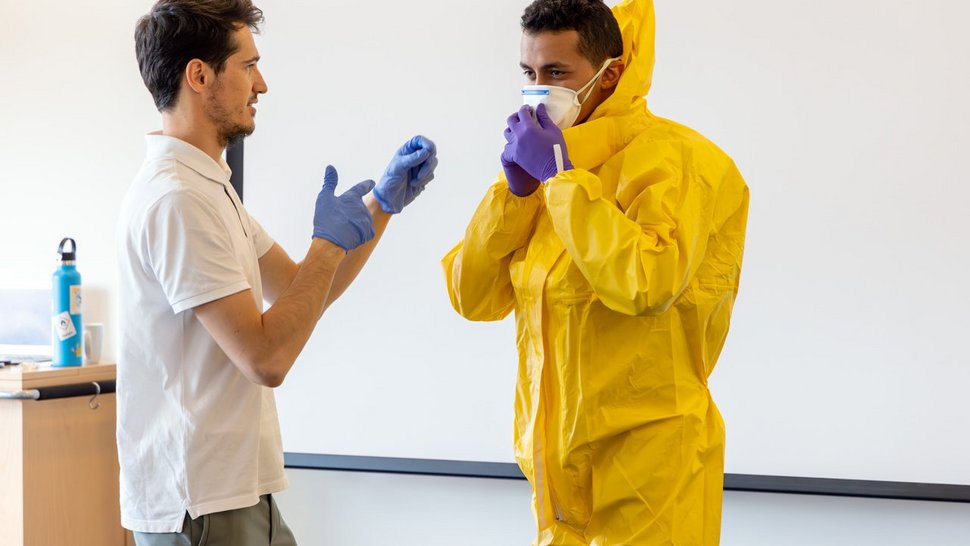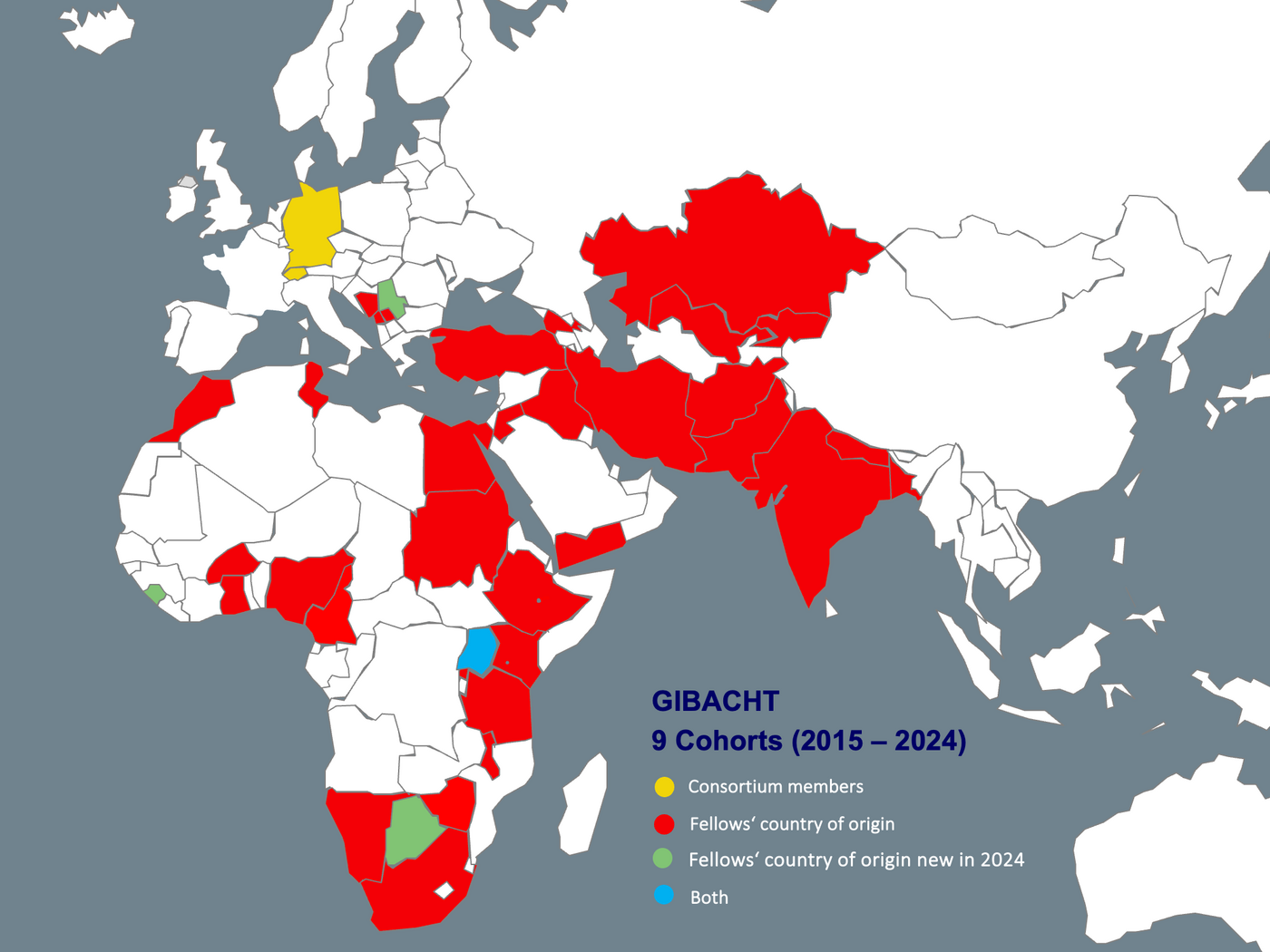Success Story: How the GIBACHT training program trains biosafety experts from around the world
Flexible and sustainable learning for global challenges
Pandemics do not respect national borders. They require a rapid international response. The Global Partnership Initiated Biosecurity Academia for Controlling Health Threats (GIBACHT) training program is a key initiative in the fight against disease outbreaks and commitment to public health. It aims to train professionals in pandemic prevention and response in partner countries in Africa, the Middle East, South and Central Asia and Eastern Europe. Results of the program's success were recently published in the journal Frontiers in Public Health.

The name says it all: GIBACHT (“Gib Acht” means “Pay Attention”) is an international training program for experts in public health, medicine, biology, epidemiology and related disciplines. “The special thing about GIBACHT is that we not only offer training and mentoring to international experts. We are also helping to sustainably strengthen the necessary capacities in the participating countries to prepare them for future infectious disease outbreaks," says Dr Eva Mertens, first author of the study and former coordinator of the GIBACHT program at the Bernhard Nocht Institute for Tropical Medicine (BNITM). GIBACHT is an initiative of the German Biosecurity Program, funded by the German Foreign Office and coordinated by the BNITM. It enables program graduates to respond quickly to outbreaks or the release of dangerous pathogens.

Teaching and Learning Approach of the GIBACHT Program
To date, GIBACHT has trained eight cohorts with a total of 122 public health professionals from 34 countries as future trainers. After completing the course, graduates work as trainers themselves, sharing their knowledge with their institutions on a long-term, sustainable basis (training-of-trainers principle). The 9th cohort of GIBACHT started in April this year with 16 scholarship holders from 15 countries.
The training is based on a blended learning approach: a combination of computer-based learning and face-to-face sessions. The curriculum covers a wide range of topics, including biosecurity, epidemiology and outbreak investigation.
"Our training program is designed to have a lasting impact. We equip healthcare professionals with the knowledge and skills to effectively combat both natural outbreaks and deliberately released biological threats. Our blended learning model ensures that the training is flexible and easily accessible so that participants can apply their knowledge directly in their professional environment," explains Mertens.


Evaluation of the program: Successes and Findings
The authors of the study measured the effectiveness of the program using the Kirkpatrick model of learning evaluation. The Kirkpatrick model evaluates training programs on four levels: Reaction, Learning, Behavior and Results. The study found that GIBACHT participants were highly satisfied with the training (Response), showed significant gains in knowledge and skills (Learning), applied their new skills in their professional environments (Behavior), and contributed to improved biosafety and biosecurity practices in their home countries (Outcomes).
"By building our alumni network, we have strengthened knowledge sharing and collaboration among graduates, faculty and staff. This network is crucial for the sustainable strengthening of reliable capacities and health structures in the participating countries," adds Mertens.
Case Study Module: Focus on practical application
A core element of the GIBACHT training program is the case study module: participants develop practical case studies based on real-life scenarios in their home countries. "According to feedback from participants, the case study is one of the most appreciated components of the program. It makes it much easier to put into practice the knowledge and skills acquired in the training," says Mertens. These case studies will be published in scientific journals and shared with the scientific community to further contribute to the field.
Original publication
Further information on the GIBACHT initiative
The goal of the GIBACHT initiative is to strengthen global capacities for dealing with biological threats. Increasing globalization augments the risk of natural biological hazards, such as laboratory accidents and unintentional releases of dangerous pathogens (biosafety), as well as intentional biological hazards from deliberate misuse (biosecurity). For more than ten years, GIBACHT has focused on minimizing the risks associated with highly pathogenic agents and their potential misuse through comprehensive training and capacity building. As part of the G7 Global Partnership, GIBACHT also makes an important contribution to combating the proliferation of weapons and materials of mass destruction.
The collaborative GIBACHT program, funded by the German Federal Foreign Office, is led by the Bernhard Nocht Institute for Tropical Medicine (Dr Dewi Ismajani Puradiredja, Theresa Habermann) and implemented together with the African Field Epidemiology Network - AFENET (Prof Elizeus Rutebemberwa), the Robert Koch Institute (Dr Kristina Aleksić-Babić) and the Swiss Tropical and Public Health Institute (Barbara Maria Bürkin, Dr Joachim Pelikan and Dr Christoph Pimmer).
For more information and news on the GIBACHT program, please visit: https://go4bsb.de/gibacht
Key achievements of the GIBACHT initiative:
- Comprehensive training: The fellowship includes 250 hours of learning and combines e-learning modules with interactive face-to-face workshops.
- Global reach: GIBACHT has trained professionals from different regions and improved international cooperation in biosafety and biosecurity.
- Lasting impact: Many alumni have established additional biosafety and biosecurity training in their home countries, extending the reach and impact of the program.
- Adaptive learning: During the COVID-19 pandemic, GIBACHT successfully transitioned to a virtual format, demonstrating resilience and adaptability in its training approach.
Related article
Contact person
Dr Eva Mertens
Email : mertens@bnitm.de
Dr Dewi Ismajani Puradiredja
Head of iACE Academy
Phone : +49 40 285380-243
Email : puradiredja@bnitm.de
Dr Anna Hein
Public Relations
Phone : +49 40 285380-269
Email : presse@bnitm.de






